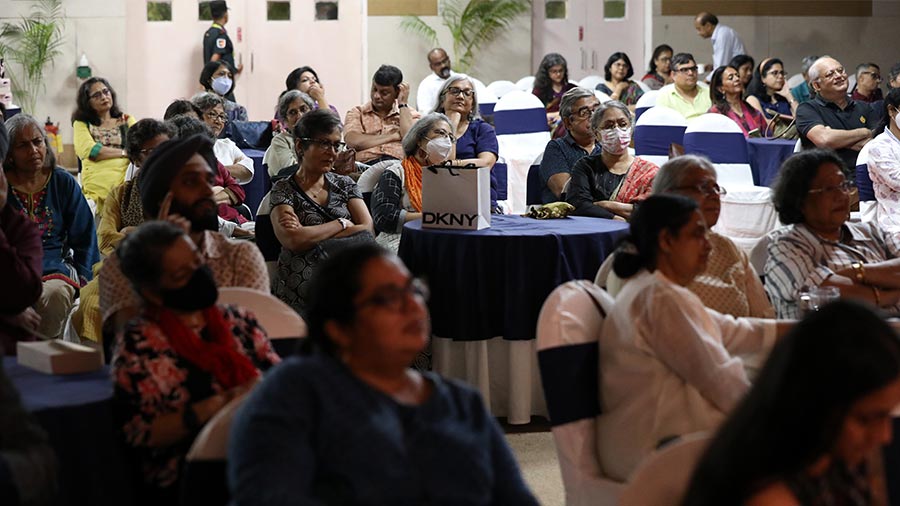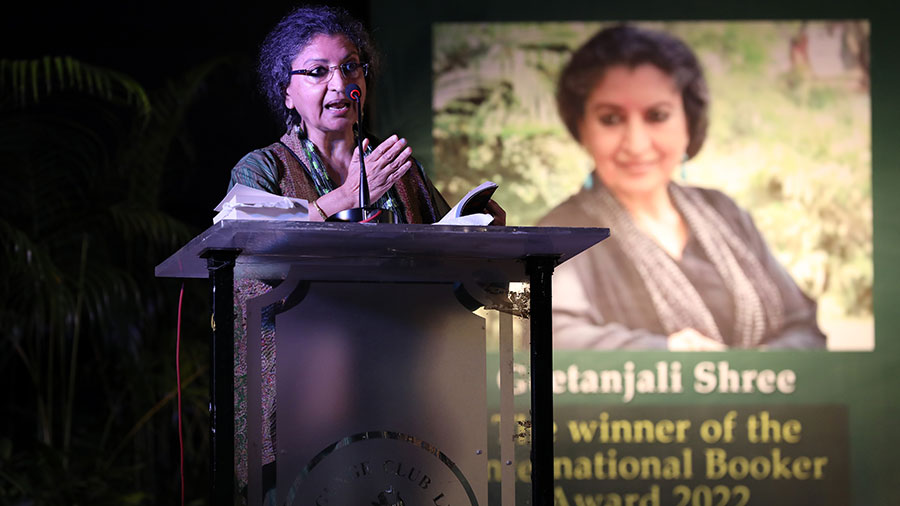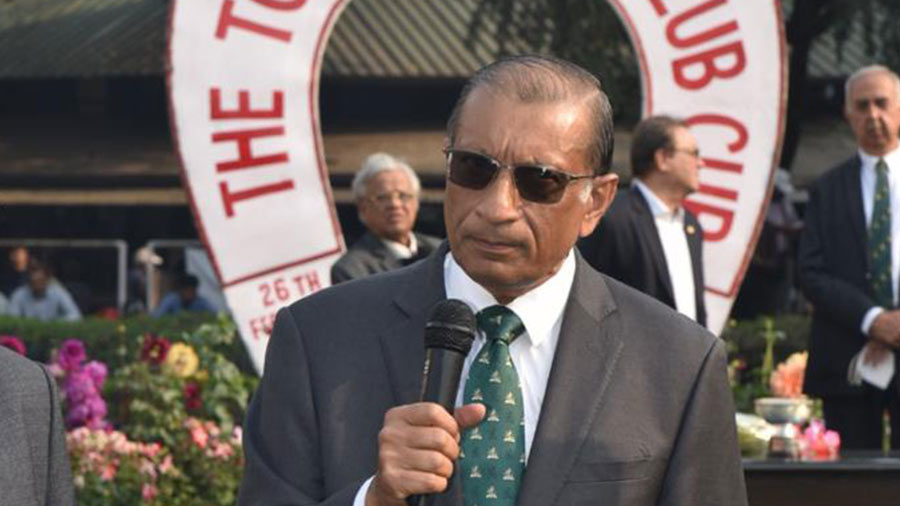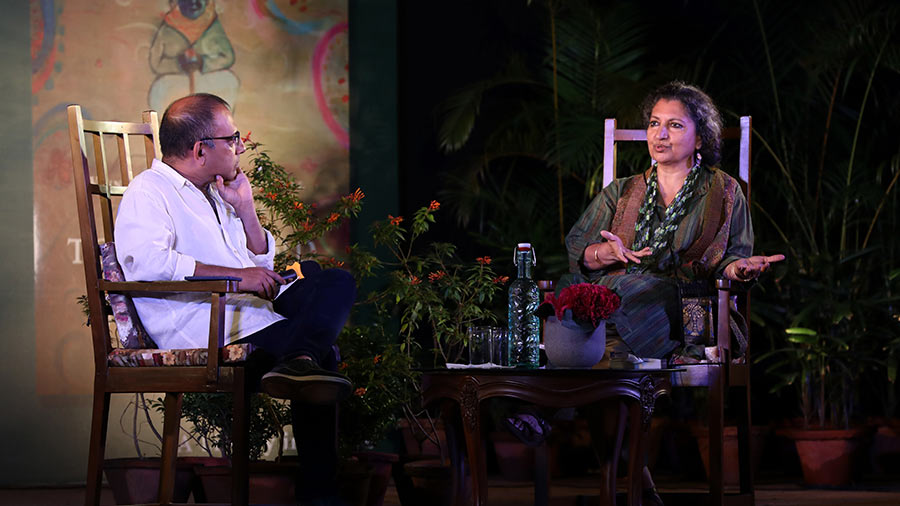The absence of rigid literary structures and an amorphous form that resembles the vastness of an ocean have always informed Geetanjali Shree’s writing. This is especially true of Ret Samadhi, her 2018 Hindi fiction novel. There is, of course, a “method in the madness”, as Shree herself said when she was in conversation with translator Arunava Sinha at Tollygunge Club recently. But the madness surrounding the method has certainly stood Shree, and regional Indian literature, in good stead; Daisy Rockwell’s English translation of Ret Samadhi, titled Tomb of Sand, won the International Booker in 2022 — a first for any work in a south Asian language.

The audience at Tolly Club
The pride in Shree’s achievement was palpable at Beyond Borders: The Art of Interpretation, as guests filled up the AC Auditorium at Tolly to listen to the conversation between Shree and “the matchmaker” Sinha, who had introduced Shree to her translator. In many ways, the discussion between the two writers mirrored Shree’s fiction-writing style – it adhered to no structure and drew in several threads of thought, as Sinha chose to focus on Shree’s authorial journey in its entirety, and not just on her Booker-winning work.
“Even though I left Kolkata more than 30 years ago, I never really left Kolkata,” said Sinha to Shree. “It is thus doubly my pleasure to be able to have my first conversation with you here.”
“Kolkata is not my home, but I wish it was,” responded Shree. “Despite being chaotic, it has a soul and energy that communicates with me. And coming to Kolkata and landing in this idyllic place called Tollygunge Club is truly something else!”
“All of us are listeners and tellers of stories from our birth,” said Shree, who admitted to feeling uncomfortable talking about herself. “Very early on, my mother told me that I was a rare child who didn’t want to hear stories – I wanted to tell them.” The author thinks her authorial journey began in earnest in her late 20s – on a train. “I always thought I was a writer, but as I grew older, I was doing everything except writing,” said Shree, who noted that her earliest writings in English as a child had never been preserved. “I was dealing with all the struggles that Indian girls in middle-class families face, which is why it never struck me that while I called myself a writer, I didn’t write. But the desire to write, and write in Hindi, was nestled in my head: I went on to do a PhD in Hindi literature. One day, during a train journey after the submission of my thesis, I began to panic – when was I going to write? I wrote a short story out of panic on that train. That story has not been preserved either, but that is how my writing journey started.”
The diverse nature of Shree’s experiences as a writer, traveller, wife, friend and observer of the world seemed to coalesce and mirror the seemingly “haphazard” form of Tomb of Sand, which Sinha said seemed to be a map of the thoughts of several minds residing within one mind. Although she writes fiction – Shree has five novels and five collections of short stories to her name – her works have developed from the world she inhabits and the people she has known. Khali Jagah (translated into English as The Empty Space by Nivedita Menon), in which a bomb explodes in a university café, killing students and destroying the lives of survivors, took shape from Shree’s experience of closely knowing a couple who lost their son to an explosion. The world-building in Tirohit (translated into English as The Roof Beneath Their Feet by Rahul Soni) was informed in large part by Shree’s observations of places of absolute freedom – adjacent rooftops in mohallas – within cloistered familial and architectural structures. “Creative writing is a mystery,” said Shree, “and that’s what I enjoy so much about it. The theme is not what I’m chasing – I’m chasing my imagination and intuition, and my intuition is made up of thousands of things.”

Geetanjali Shree read out sections from 'Ret Samadhi' and its English translation, 'Tomb of Sand'
At the beginning of the session, Shree had held the audience captive with her electrifying reading of a portion of Ret Samadhi, both from the original and from Rockwell’s translation, thereby giving everyone who hadn’t read the book a glimpse into why it deserved the Booker. The pièce de résistance, however, came towards the end of the discussion, when Sinha surprised Shree and the audience with his Bengali translation of the opening lines of Ret Samadhi. As many agreed, this ought to eventually morph into a full Bengali translation of Shree’s seminal work.

Joydeep Datta Gupta

“It is a rare privilege for us at Tollygunge Club to have a winner of the International Booker Prize present with us in person to talk about her book. It was also a privilege to have someone as accomplished as Arunava Sinha lead the conversation. Given that many are not well-versed in Hindi in this part of the country, we are grateful to Geetanjali Shree for having her book translated so that we are allowed a window to worlds which we might not have been able to access otherwise. It was encouraging to see that the audience at this event was larger than the turnouts we have had at many rock concerts!”
— Joydeep Datta Gupta, president, Tollygunge Club

Anil Mukerji

